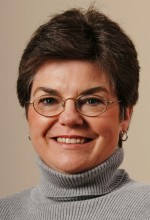I work for an advocacy group, and we’re laboring to abolish the death penalty in our state. That means I frequently drive down to our capital city, Lincoln, where our main offices are located.
It’s a pleasant drive. There’s never much traffic at the times I travel, and the scenery is rolling hills and farmland. I bask in the changing seasons and the occasional hawk flying overhead looking for prey.
I grew up on a farm, so I never tire of looking at the corn making its yearly advance from tiny green shoots to worn out, depleted husks. The drive reminds me of life’s rhythms and enduring cycles.
Sometimes, I say the rosary on my journey, but often I listen to National Public Radio.
As we all know, 2014 has been a bad news year. So many terrible events have happened that each eclipses the last. Doesn’t it seem like a long time ago that we saw thousands of poor kids flocking to our border from Central America?
Even though the news cycle has moved on, many still languish in detention centers, and although the tide has slowed, thousands still yearn for freedom in Honduras and Guatemala.
[hotblock]
From that crisis, we were suddenly alerted to something called ISIS. The Islamic State was media-savvy enough to start beheading people and that made Americans pay attention, whereas mere torture and execution by other means might not keep us glued to CNN.
The horrors of the Ebola crisis in Africa took a while to capture our attention, but a handful of cases in Texas made us flock to the TV. Somehow, the misery and intense suffering of people on the other side of the globe doesn’t always rivet us.
That’s why, one day on my pleasant drive, I was struck to hear a Yazidi being interviewed right down the road in Lincoln. Remember the Yazidis?
The Yazidi crisis was our first glimpse of ISIS. The Yazidis, who for all I knew a few months ago could have been characters from a Dr. Seuss book, are followers of a small religion with roots in Zoroastrianism and Sufi Islam.
That mixture makes them anathema — devil worshippers — to the extreme jihadists who have perverted the Muslim faith. The Yazidis have been persecuted, their women forced into sexual slavery, their men killed.
For one brief moment, Yazidis captured the media spotlight as thousands of them fled to a mountaintop to stave off death and capture. It’s why the U.S. got involved trying to deliver humanitarian goods and deliverance to the Yazidis.
Lincoln, Nebraska, has over 100 Yazidi immigrant families. When I heard the articulate young Yazidi woman in Lincoln being interviewed on NPR, I realized she could be my next-door neighbor. In many ways, she is my neighbor.
Why did that make the Yazidi plight so much more personal to me?
Recently, a Jesuit with years of experience in refugee camps offered three pieces of advice for people concerned with this world’s suffering. Pray intensely for the world, he said. Secondly, pay attention. Don’t just get wrapped up in the crisis du jour. And finally, commit yourself to spend time with the poor, hours a week, or a weekend a month.
The poor suffer throughout the world, but the suffering of those close to us, like the Yazidi woman who suddenly entered my peaceful drive, helps us connect with all suffering.
Finding God in all things means finding God in the poor.
PREVIOUS: Build a better future by learning from relationships
NEXT: Diversity: The latest in parish ministry




Share this story